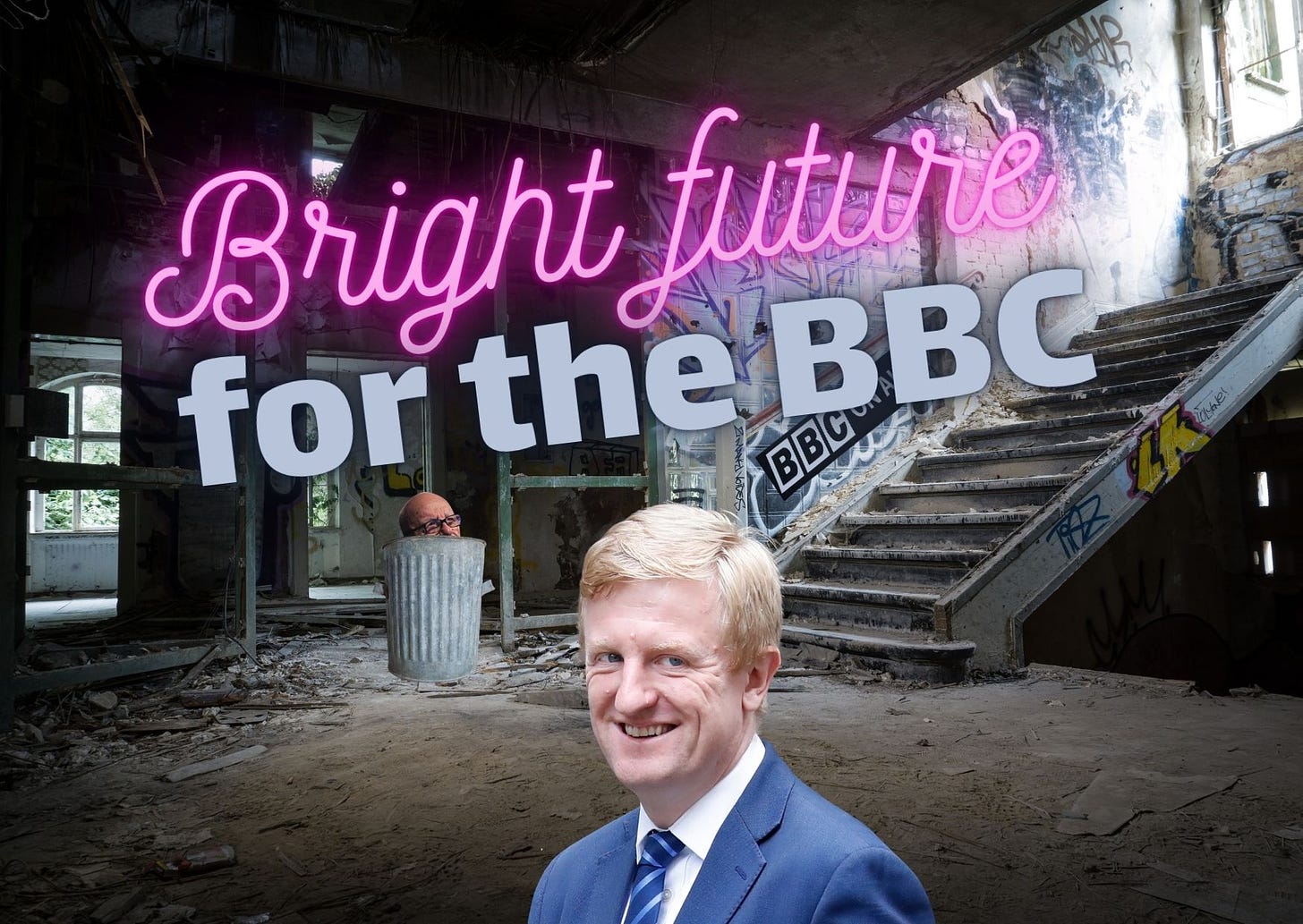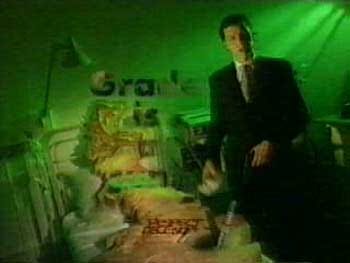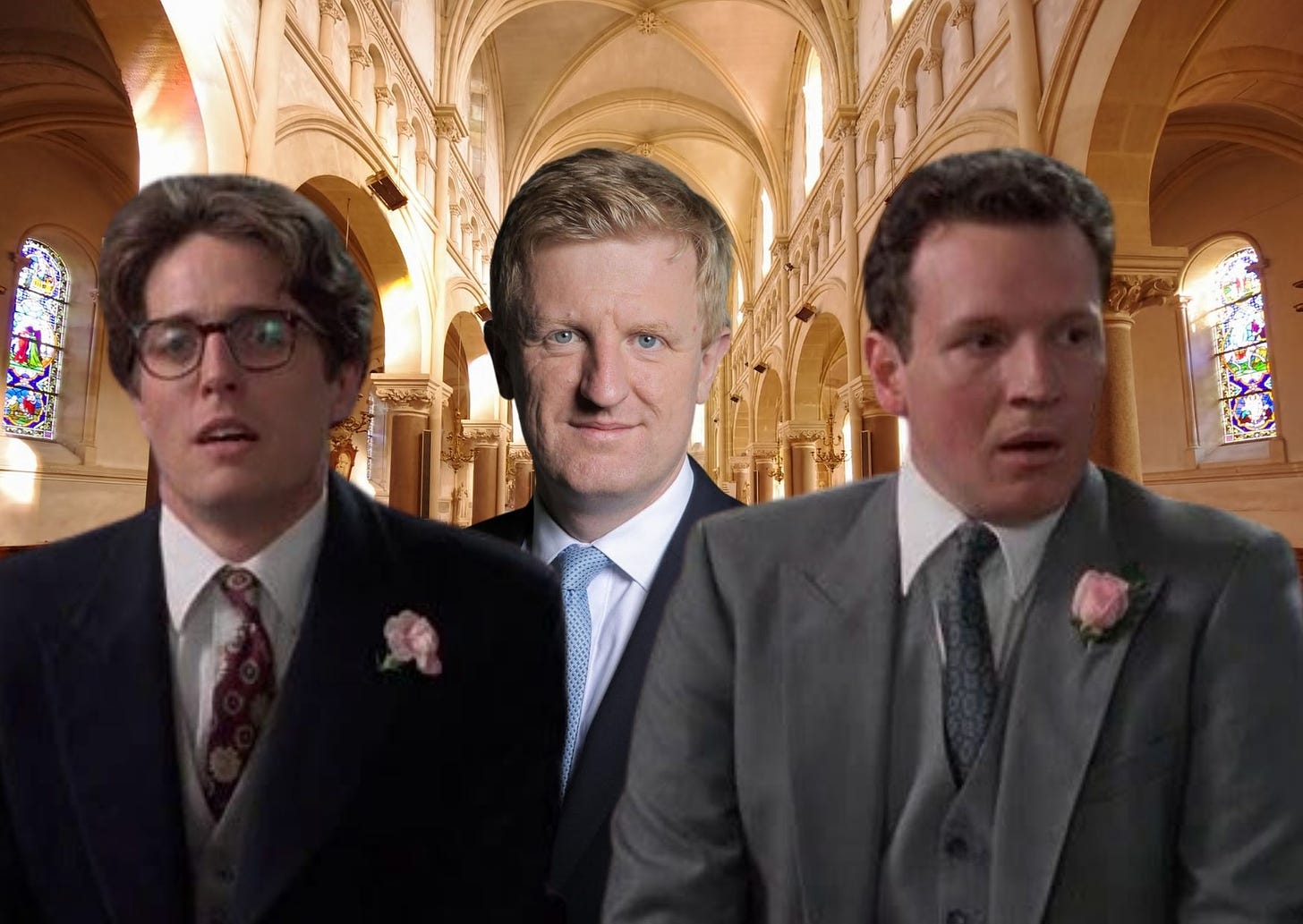Oliver Dowden, the Culture Secretary is a barely useful idiot and he is trying to destroy the BBC
This is not a balanced edition of the newsletter as I actively hate him.
I think it’s time we ask really profound questions about the role of Oliver Dowden in the digital age and indeed whether we need him at all. I’m going to announce a panel of experts to assess the future of the potato-faced Culture Secretary, which I will stuff with people who hate him as much as I do but don’t worry it’ll definitely be ‘impartial’.
The trigger for this vital review was Dowden’s comments in The Daily Telegraph that “it is time to ask really profound questions about the role of public service broadcasters such as the BBC and Channel 4.” Given that the closest Dowden gets to culture is scraping mould off bread in an effort to prove his frugality, I’m not entirely confident that his hand-picked panel of bastards will decide the BBC is vital.
In his Telegraph article — ghost-written it seems by a Mr D Cummings — Dowden points to Netflix and Amazon Prime as reasons the BBC and Channel 4 are not quite up to it, saying they have “lobbed a grenade into the system”. He goes on to say that his panel of broadcasting, journalism and technology high heid yins will not be “tiptoeing around the edges” but rather “drilling right down into the current system and how it operates”. My government bullshit translator reads: “We’ll privatise them.”
But maybe I’m being unfair. Let’s take a look at the members of the public service broadcasting panel that Dowden has assembled. Perhaps it’s a veritable Avengers of Broadcasting Excellence… oh.
Leading the charge it’s Conservative peer Lord Grade — a former chairman of the BBC, who also ran Channel 4 and ITV — who has been putting the boot into the BBC for years. My favourite story about Grade is his clash with Chris Morris over Brass Eye, which saw the satirist win in the most fantastic way.
Grade writes about the incident in his autobiography and, even while telling it himself, manages to come across as a copper-bottomed shit:
"I had postponed [the Brass Eye series’] initial transmission date by a couple of months because I was unhappy about a hoax Morris had perpetrated on a couple of government ministers… Chris Morris responded to the postponement in a typically robust way. He wrote to president Mandela explaining that this series had been banned by Michael Grade, who had led a campaign to keep the president in prison. He also urged Oliver North to intervene on his behalf…
[When the series was finally broadcast] In the final programme Morris went too far. He managed to doctor the final transmission tape so that the subliminal message 'Grade is a cunt' was broadcast. What upset me was not the insult, though I thought it base ingratitude after the hammering I had taken to get the series on air. It was a breach of the oldest convention in broadcasting; the editor trusts the presenter not to speak or act unilaterally on air."
I recommend reading Grade’s autobiography as it’s the closest a real book gets to Alan Partridge’s memoir with the same number of “needless to say I had the last laugh” moments, practically one per page.
Dowden’s panel also includes Sir Robbie Gibb, former director of communications to Theresa May, former head of BBC Westminster, and current prime mover in launching GB News, a US-style news channel designed to compete with… the BBC and Channel 4 News. Just taste the rich beefy flavour of impartiality!
Gibb and Grade will be joined by Baroness Bertin, David Cameron’s former press secretary, Conservative MP Andrew Griffith, Boris Johnson’s former business tsar and a former COO of Sky, and Nichola Mendelsohn, Facebook’s VP for Europe. There’s also a smattering of other executives from Sky, ITN, and Endemol Shine.
Putting that collection of people in the position to decide what should happen to the BBC and Channel 4 is like asking Harold Shipman for advice on elder care.
Dowden’s burbling defence of his position, arguing that Netflix, Amazon, Apple etc. have reduced the need for the BBC is ludicrous. None of those players is going to produce local news any time before hell freezes over, and none of them is going to produce the range of documentaries and audio drama that the Radio 4 alone develops.
If you wanted to argue from a purely self-interested, capitalist perspective, the BBC and Channel 4 both develop properties in news, drama, and general entertainment formats that are exported incredibly successfully, bringing millions of pounds into the UK. They also support and promote areas of culture that would not be covered by purely commercial players.
New British music is fostered by BBC Radio One and BBC 6Music while more esoteric classical music has a place on BBC Radio Three which it would not be given on commercial rivals.
Despite Dowden’s panel being a bucket of vipers, it’s still not enough for those vituperative right-wing outlets who want the BBC dead. A look at the response from scandal blog Guido Fawkes is instructive:
The case for Channel 4 being privatised remains strong as does the case for BBC Radio moving to an advertiser funded model. Guido fails to understand what the “public service” remit of BBC Radio is in this day and age – it seems to duplicate the output of independent radio – just at the expense of people who don’t listen to it. Local BBC radio has also destroyed the viability of independent media to compete profitably.
Jo Stevens MP, Labour’s Culture Shadow robotically opines “The government cannot continue to pass the buck. Tory cuts have already led to job losses and programme changes as well as axing the free TV licence for the over-75s.” Which is a re-writing of history, the BBC grabbed a deal with inflation-linked rises in licence fee taxes in exchange for not charging the over-75s. There was no funding cut and whether or not OAPs are charged the licence fee makes no difference to the BBC’s bloated costs. The BBC now want to renege on the deal they said was fair at the time.
John O’Connell, of the TaxPayers’ Alliance puts it clearly, saying the BBC must “keep costs down to protect households from yet another painful rise in the licence fee. But to guarantee the best value for money, ministers must prepare to bring the BBC’s funding model into the twenty first-century. In the long term, public service broadcasters can only compete and survive if we axe the TV tax and let the BBC stand on its own two feet.”The days of a monolithic broadcaster are past, the twenty-first century is a multi-platform, multi-channel world of choice, coercive funding has had its day.
Guido ‘fails to understand’ why BBC Radio has a public service remit ‘in this day and age’ because Guido makes its money using aggression, obfuscation, abuse and tactical ignorance. If BBC local radio was wiped out right now the commercial alternatives would not replace the lost coverage and reporting — most of the BBC’s commercial rivals have moved to a centralised newsroom model and they simply would not invest in court reporting, coverage of local schools, and focus on the issue that people in local areas truly care about.
Quoting the TaxPayer’s Alliance — the most deceptively-named thinktank in Britain, which speaks only for a small number of extremely wealthy ‘taxpayers’ — says everything you need to know about Guido’s propagandistic approach to covering debates about the BBC. Guido’s founder, Paul ‘ingrained’ Staines, will not be happy until the BBC is dead and gone, even if his chuckling Muttley-like sidekick Tom Harwood will no longer be able to pop up on the BBC News channel like an absurd Punch & Judy puppet.
Oliver Dowden comes across like Hugh Grant’s bumbling brother in some awful 90s Richard Curtis romcom, tripping over his words and himself, but realise: He is as big a snake as the rest of the Conservative Cabinet.
While he seems polite, Dowden’s intentions are as snide as the rest. He is manoeuvring to weaken the BBC then kill it, and to cut Channel 4 off at the knees. This has to be fought. If the BBC is destroyed, it will never be replaced and something beautiful in British life will be gone forever.
I’m as frustrated with BBC News as the next leftist, but News is not the entirety of the BBC’s output. BBC News needs reform.
Burning down the whole BBC would be a tragedy.





